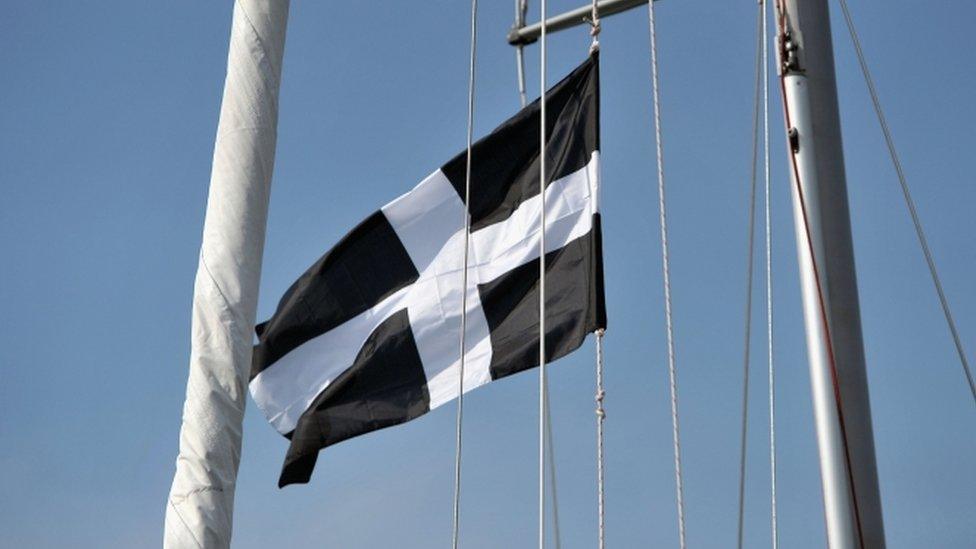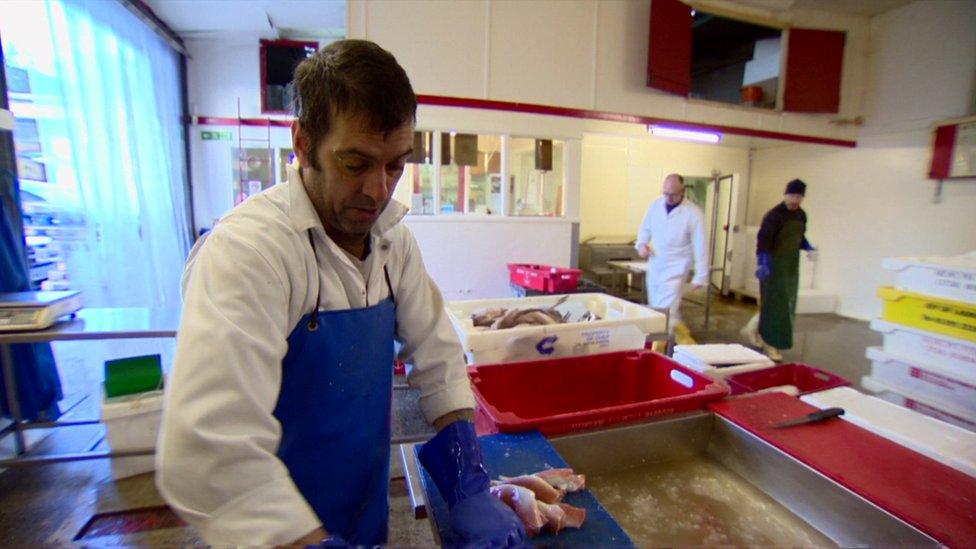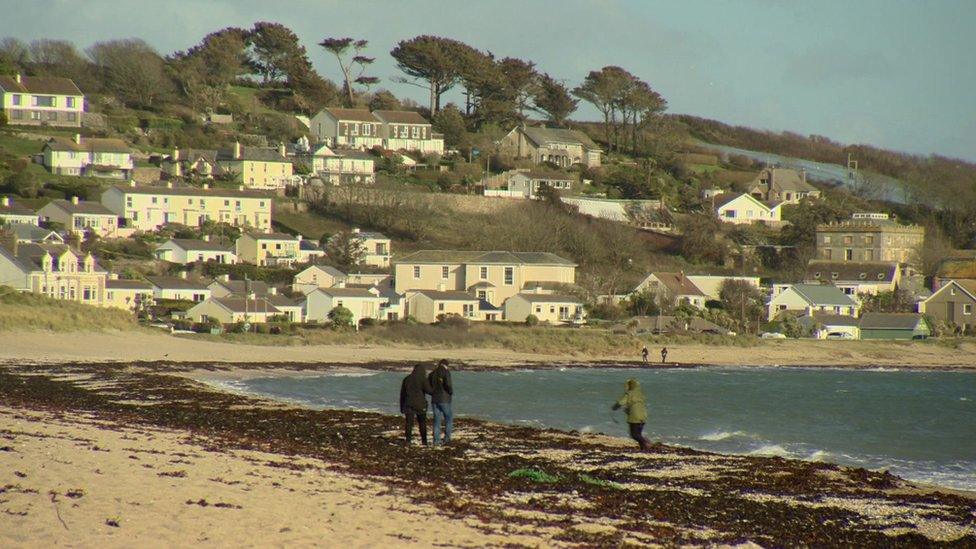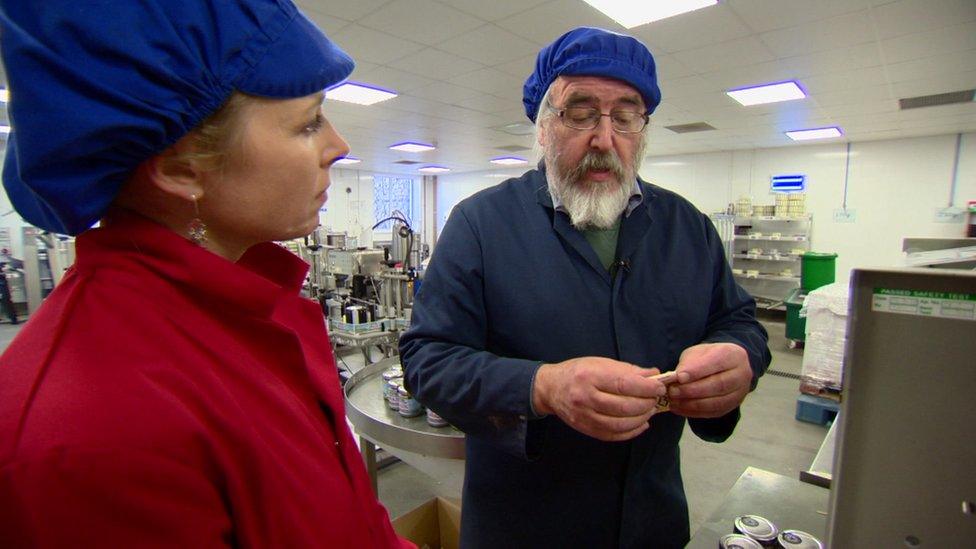Cornwall: In or Out?
- Published

Over the last 15 years, Cornwall has received more than £1bn of EU structural investment. Don't worry if that fact has passed you by. Plenty of the people I met in Cornwall appear to be unaware of it too.
I'm testing out how the EU impacts on people's lives for a Newsnight series, Referendum Road. First stop, five hours by train from Westminster, even further by plane from Brussels, was Penzance.
From the Europhiles' perspective, Cornwall has lots to thank Europe for. The Council of Europe gave Cornish protected minority language status back in 2002 and Cornish clotted cream and pasties are among the local delicacies given special EU protection. And then there's the small matter of millions of pounds.
But Matthew Lobb, a 26-year-old volunteer, told me: "Living down here, it's just a dead end… I haven't heard of no money being put into Cornwall."
Lynn Watson, a resident on Penzance's Treneere estate, said: "I don't know where the money from the EU has gone, but it hasn't come here." She then added that she doesn't want to leave the EU.
Last year, Treneere was designated as the most deprived area of Cornwall. I visited the Whole Again Communities project, running a soup kitchen for anyone in need, and met Brian Collett, who was on his way back from a local food bank.
Life's been tough since he left the navy and he told me he's homeless and now living in a tent. "But I suppose a tent is better than a doorway," he said. "And they do keep telling me the sun is going to come out."

Fishery worker Darren Shah believes "it's time we looked after ourselves"
On the deprivation index, parts of Cornwall are poorer than regions of Poland, Lithuania and Hungary and, because of that, it's eligible for EU funds. The aim is to have a long-term impact on the economy.
Between 2000 and 2014, £888m was invested in Cornwall from the European Regional Development Fund (ERDF) and the European Social Fund (ESF). The money has financed infrastructure projects, airports, universities, road widening schemes, superfast broadband and local businesses.
Another £486m has been earmarked between 2014 and 2020.
But when it comes to the referendum, it appears hard cash doesn't automatically buy loyalty.
Europe 'not locally democratic'
As Stephen Cummins, a Penzance resident buying his fish from a local door-to-door salesman, put it: "My initial reaction was to get out, even though Cornwall has had all these millions - because I'm thinking nationally. But I'm still not certain, there are too many unknowns."
The unknowns of a Brexit (there is no word for that in Cornish) were one explanation given by folk who told me they'll vote to stay in. But I also found plenty threatening to vote to leave.
As in so many coastal areas, the fishing fraternity are keen "outers". They talk of the good old days before EU quotas, but it's not only about fish.
Martin Clive, who runs Newlyn Fish Co, told me: "I don't like the way Europe doesn't feel locally democratic."

Despite its beauty, economic deprivation in parts of Cornwall mean it is eligible for EU funding
Darren Shah, busy filleting the fish that had been bought at dawn at Newlyn market to send to the more lucrative London market, said: "It's time we looked after ourselves."
A YouGov survey suggested Cornwall is veering Eurosceptic as we head towards 23 June. Part of the issue may be that the EU doesn't obviously appear to trumpet its investment. Unlike in some other parts of Europe, I barely saw that blue EU sign with its familiar yellow stars.
EU 'benefits Cornwall'
One exception is Carley's Organic Foods. Based just outside Truro, it is one of more than 25,000 Cornish businesses to have benefited from ERDF investment. On the wall outside its new sustainable premises, part-funded by the EU, there's a little EU logo.
Owner John Carley explained that the £300,000 investment boosted turnover significantly and meant the firm could expand from three to nine employees in a place where every job counts.
He's worried that the Cornish - and the British in general - will vote to leave the EU: "I suppose there's a degree of contrariness in Cornwall. We don't like to be told what to do. I sincerely hope the people of Cornwall in the majority will realise the benefits we get from being in the EU," he said.

John Carley says his company has has been helped by EU investment
Cornwall is the only English area that has access to this extra EU structural investment, because its GDP is less than 75% of the EU member average. The county has less than 1% of the UK population, but the funds earmarked in the six years up to 2020 account for 5% of the EU's UK investment.
It's a substantial sum and some here are worried that the county - and the nation - could be heading for Brexit without properly considering the consequences.
Susan Stuart spent the best part of two years renovating Penzance's Chapel House, which she's turned into a hotel. She's backing local regeneration plans, which include hopes for new flood defences, cycle paths and a digital hub.
She told me they couldn't fund this without going to Europe and an out vote means "we wouldn't get the funding".
Something for the Cornish to mull over as they get closer to referendum day.
Watch Katie's full report on Newsnight via BBC iPlayer (UK only).